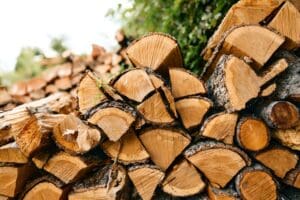Choosing the right firewood is key to a warm home. Knowing the best and worst woods for your fireplace is important. It helps keep your home warm, efficient, and safe during cold months.
Every fireplace lover knows that wood burns differently. The type of wood affects heat, burning time, and performance. Some woods burn well and warm, while others can be dangerous or inefficient.
This guide will show you the best wood for warmth and the worst to avoid. We’ll cover everything from top hardwoods to softwoods to avoid. You’ll learn what every homeowner needs to know about picking the right firewood, including a detail about the 6 best & 6 worst woods to burn in this guide.
Choosing the right wood saves money and makes heating better. It also makes your fireplace safer. Let’s explore firewood selection and find the best wood for your home’s needs.
Characteristics of Good Firewood
Choosing the right firewood can greatly improve your heating. Knowing what makes good firewood helps you pick wood that burns well. This wood will keep you warm and save you trouble.
Low Moisture Content Matters
The moisture in firewood affects how well it burns. Wood that’s dry burns better and longer. Wood that’s too wet makes a lot of smoke, doesn’t heat well, and can harm your chimney.
High Heat Output Efficiency
Good firewood gives off a lot of heat. Hardwoods like oak and maple burn hotter than softwoods. You want wood that heats well and doesn’t take up too much space.
Minimal Smoke and Creosote Production
Quality firewood burns clean and doesn’t make much smoke. Too much smoke means the wood isn’t burning right. Clean-burning wood keeps your fireplace safe, improves air, and makes heating more enjoyable.
By picking wood with these traits, you’ll have a safer, warmer, and more comfortable home.
6 Best Woods to Burn
Choosing the right firewood can make your fireplace experience better. The best types give off lots of heat, little smoke, and burn for a long time. Knowing which logs are best will help you have a warm, efficient, and fun fire every time.
1. Oak Logs: The Heating Powerhouse
Oak logs are top-notch for burning. They are dense, so they heat up a lot and burn slowly. This makes them great for keeping your home warm for a long time.
Seasoned oak logs give off consistent, hot flames. They are perfect for keeping your home cozy on cold winter nights.
2. Hickory Logs: Intense Heat and Lasting Performance
Hickory logs are loved by fireplace fans for their amazing heat. They burn very hot and last a long time. Outdoor cooks also love hickory for its smoky flavor in grilling and smoking.
3. Maple Logs: Clean and Steady Burning
Maple logs burn clean and steady, with moderate heat. They make little sparks and have a nice, consistent flame. Maple is very popular in areas with lots of maple trees.
4. Ash Logs: Quick-Igniting and Efficient
Ash logs are known for lighting up fast and burning efficiently. They heat up quickly, making them ideal for fast warming. Ash wood has low moisture, which helps it burn well.
5. Beech Logs: Dense and Long-Lasting
Beech logs are known for their density, which makes them burn slowly and produce a long-lasting heat. They have a moderate to high heat output and are often used for cooking and heating.
6. Cherry Logs: Aromatic and Efficient
Cherry logs are a popular choice for their aromatic smoke and efficient burning. They have a mild, sweet flavor and are often used for smoking meats. Cherry logs are also known for their moderate heat output and long-lasting burn.
Characteristics of Bad Firewood
Not all woods are good for burning in your fireplace. Knowing what makes bad firewood can help you choose better. This way, you can avoid heating problems and enjoy warmth and comfort.
High Moisture Content Challenges
Woods with too much moisture are hard to burn. Wet wood is hard to light and doesn’t burn well. It also makes a lot of smoke and doesn’t heat up your home.
Seasoned wood, on the other hand, is dry and burns well. It’s the best choice for reliable heat.
Smoke and Creosote Risks
Some woods make a lot of smoke and creosote. These are bad for your health and can damage your chimney. Pine and other resinous woods are especially bad because they release more harmful particles.
Low Heat Efficiency Concerns
Some woods burn fast but don’t give off much heat. They don’t keep your home warm for long. You’ll need to add more wood often.
Choosing denser firewood helps keep your home warm. It burns longer and gives off more heat.
6 Worst Woods to Burn
Not all firewood is the same. Some types can cause big problems for your fireplace and heating. Knowing the worst firewood types helps you make better choices and stay safe.
Some woods are known for causing trouble when used as firewood. They can make a lot of smoke, build up dangerous creosote, and not give much heat.
1. Pine: A Risky Fireplace Choice
Pine is a big problem for indoor fires. It has lots of sap and resin, leading to quick creosote buildup in chimneys. Pine burns fast, giving less heat and increasing the risk of chimney fires.
2. Poplar: Low Heat, High Moisture
Poplar is also a bad choice for firewood. It’s low in density and has a lot of moisture. This means it doesn’t give much heat and burns fast, making it bad for heating homes.
3. Willow: Another Problematic Wood
Willow is similar to poplar. It has a lot of water and doesn’t give much heat. It burns quickly and doesn’t warm well, making it bad for heating homes.
4. Cedar: Beautiful but Challenging
Cedar smells nice, but it’s a problem for indoor fires. It makes a lot of smoke and builds up creosote fast. The oils in cedar make it dangerous for indoor fireplaces.
Plywood and Chipboard: Toxic and Inefficient
Plywood and chipboard are made from composite materials and should not be burned in your wood burner. They release toxic chemicals, including formaldehyde, when burned, which can be hazardous to your health. Additionally, they produce little heat and can cause problems with your chimney.
Driftwood: Salt-Laden and Corrosive
Driftwood may seem like a convenient and free option for firewood, but it’s not a good choice. Driftwood is often saturated with salt, which can corrode your wood burner and chimney. Additionally, the salt can produce a toxic smoke that’s hazardous to your health.
Tips for Selecting Firewood: Seasoning wood, Storing firewood & Local availability
Choosing the right firewood is important. It starts with understanding how to season wood. Wood needs to dry for 6-12 months to burn better.
Storing firewood right keeps it in good shape. Use pallets or a wood rack to keep it off the ground. Store it in a dry place with a cover to protect it from rain and snow.
Local firewood is key. Buying from nearby helps local forestry and saves money. Talk to local tree services or landscapers for good wood options.
Look for wood with cracks at the ends for seasoning. Seasoned wood sounds hollow and feels lighter. Avoid wood with mold or too much bark.
Different woods burn differently. Hardwoods like oak give longer heat than softwoods. Always choose dry, seasoned wood for the best fire.
Environmental and Safety Considerations
Using firewood responsibly is more than picking the right logs. It’s about keeping your home safe and the environment protected. Knowing how firewood affects the environment is key.
Choose firewood that’s harvested sustainably. Look for wood from forests that are managed well or have certifications. This helps forests grow back and keeps wood available for the future.
Burning firewood can affect the air quality. Different types of wood release different amounts of smoke and particles. Burning dry, seasoned wood is cleaner and cuts down on harmful emissions. Make sure your logs are well-seasoned to burn cleaner.
Storing firewood right is important for its quality and safety. Keep it in a dry, elevated spot away from your home. This prevents moisture and pests, making your firewood burn better and cleaner.
Adding safety steps is good for your home and the planet. Use fire screens, clean your chimney, and have smoke detectors. Regular upkeep stops fires and keeps the air in your home clean.
Conclusion
Choosing the right firewood is more than just picking up any log you find. Our best firewood summary shows that wood selection affects both your heating efficiency and safety. Oak, hickory, maple, and ash are top choices, while pine, poplar, and cedar are best avoided for indoor fireplaces.
When picking your firewood, think about moisture content, heat output, and smoke production. Lektowood fuels are great for those looking for high-quality, seasoned wood. This wood burns cleanly and keeps your home warm consistently. Proper storage and seasoning can make your wood last longer and burn better.
Safety and environmental concerns should guide your firewood choices. Opt for locally sourced, dry wood to lessen environmental harm and cut down on creosote buildup. Knowing the traits of different wood types helps make your home heating safer and more efficient.
The best firewood is about more than just heat. It’s about making your home cozy, safe, and sustainable. Whether you’re a seasoned fireplace user or new to it, these tips will help you choose the right wood. Enjoy warm, cozy nights by the fire with these insights.
Read more:
6 Best Woods for Heat and 6 Worst for Your Fireplace
















